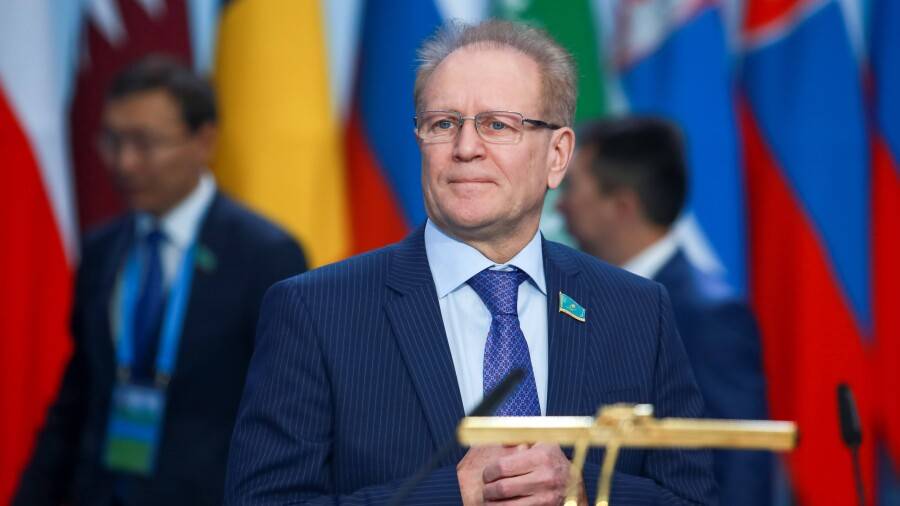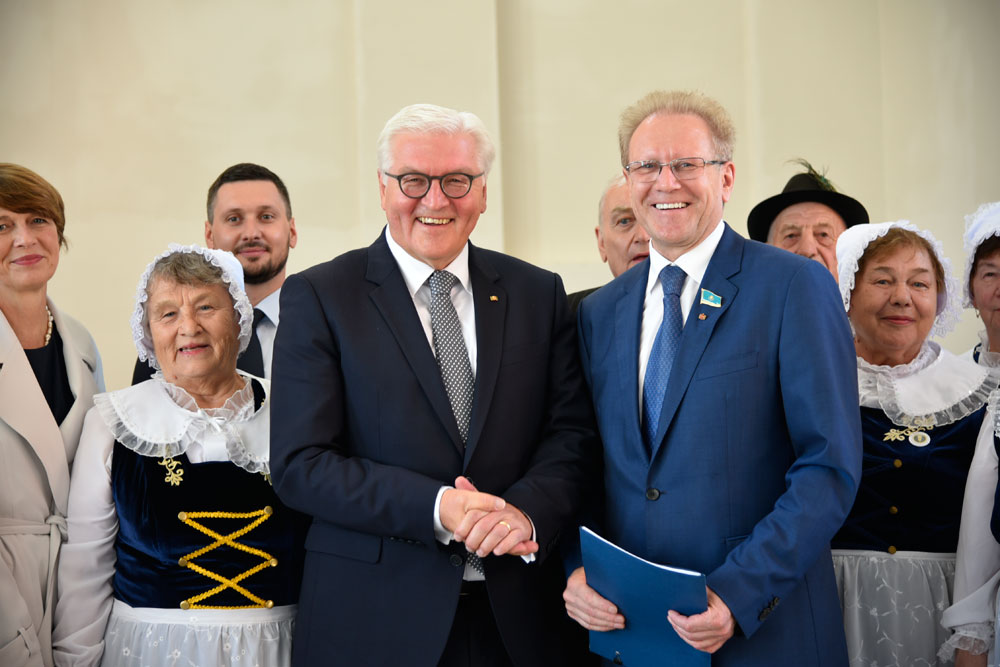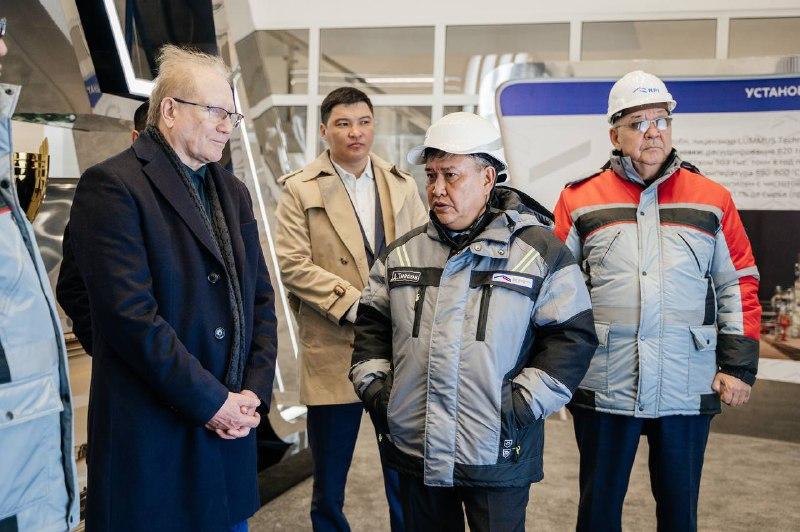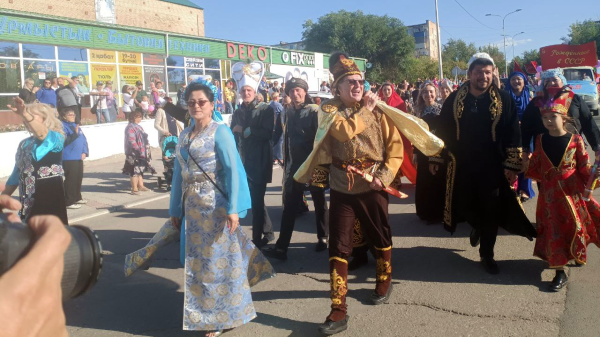ASTANA – Albert Rau, deputy chairman of the Mazhilis, the lower house of the Parliament, and co-founder of the Wiedergeburt Kazakh Association of Germans, shared his insights on the significance of Kazakh-German relations, the role of the German community in strengthening ties, and the importance of preserving cultural traditions to maintain heritage and identity in an interview with Kazinform news agency.

Albert Rau, Deputy Chairman of the Mazhilis, the lower house of the Parliament and co-founder of the Public Foundation Kazakh Association of Germans Wiedergeburt. Photo credit: informburo.kz
Below is the Q&A with Albert Rau.
What do you consider as your most significant achievement, given the numerous important positions you have held?
My career development, both professionally and personally, took place in independent Kazakhstan. I have served as deputy akim (mayor), akim of the region, led a national company, the ministry of industry, and now hold the position of deputy chairman of the Mazhilis. Despite these various roles, the most significant accomplishment for me is heading my hometown of Lisakovsk in the Kostanai Region for a decade. During the 1990s, my team not only preserved the city through challenging times but helped it grow. Today, Lisakovsk is thriving, and I take pride in its cleanliness—cleaner than many German cities. We cultivated a culture of cleanliness, which we taught from an early age, as it is more than just appearance, it is part of our responsibility and culture.

Albert Rau and German Federal President Frank-Walter Steinmeier. During his official visit to Kazakhstan, he visited the Lutheran Church in Astana, the opening of which was timed to coincide with this event. Astana, July 2017. Photo credit: parlam.kz
I felt a great sense of duty toward my hometown, my friends, and loved ones. Many people were emigrating to Germany back then—around 6,000 from my city alone. But I said, ‘How can I leave when I have such responsibility?’ Even now, my German colleagues ask why I did not emigrate. My answer is simple: the most important thing is realizing your potential. I never applied to leave because I knew I could better fulfill myself here. Unfortunately, many who left faced challenges. While some thrived in business and medicine, others struggled to regain the professional standing they had in Kazakhstan.
Here in Kazakhstan, I have earned numerous awards and recognition both domestically and internationally. I received Germany’s highest award, the Grand Cross of Merit, for my efforts in fostering Kazakh-German relations. My work in building ties between our countries has been a significant aspect to me.
You headed the Kazakh-German Intergovernmental Commission. How do you view the importance of cooperation between Kazakhstan and Germany?
Kazakhstan and Germany complement each other in many sectors, and the potential for collaboration is immense. While the economy is the foundation, we also work together in healthcare, culture, and education. Germany is a strategic partner for Kazakhstan, which is why President Kassym-Jomart Tokayev made his first European visit there. Our relationship continues to grow, and we anticipate even deeper cooperation in the future. It is also worth noting that 90% of German investments are directed toward manufacturing—machinery, chemicals, and construction materials—areas in which Germany excels. High-level visits from German officials, such as the Chancellor, always play an important role in advancing our relations.

Albert Rau, who arrived in Atyrau on a working visit, got acquainted with the work of the KPI complex. Photo credit: sknews.kz
How do you evaluate the German community’s participation in the Assembly of People of Kazakhstan?
The German community has been involved in the Assembly of People of Kazakhstan since its inception. I led the German society in Lisakovsk before transitioning into public service, and later, I was asked to lead the Kazakh Association of Germans. One of our significant achievements was establishing the Kazakhstan-Germany Center in Astana, which has strengthened our community and enriched cultural and educational cooperation between our nations.

Lisakovsk celebrated its 52nd birthday on August 12, 2023. Albert Rau is considered the organizer and ideological inspirer of the carnival. During the event, he easily communicated with the townspeople, congratulated everyone on the holiday, took pictures with everyone. Photo credit: ng.kz
I am confident that the organization is progressing in the right direction, and the leadership transition has been seamless. Yevgeny Bolgert now heads the organization and also serves as the member of the Senate [ the upper house of the Kazakh Parliament]. I am pleased to see his initiative to establish a school with advanced German language studies in Astana coming to fruition.
The German community is represented in almost every region of Kazakhstan. At both national and regional levels, we have been active participants in the assembly’s work, fully supporting its ideas and principles.
Which German traditions have been preserved within the German community in Kazakhstan?
In our ethnocultural association, we maintain strong connections between generations, passing on traditional songs, dances, customs, and ceremonies, such as weddings. While Christmas and Easter hold deep religious significance, they also involve cultural events, fairs, and celebrations that foster cultural unity and social bonds.
Our goal is to preserve these traditions, which link us to our heritage, while strengthening the community’s identity.
How has migration to Germany affected the German community in Kazakhstan, and what cultural changes have emerged?
Kazakh Germans are different from Germans in Germany or Russia. Our community is shaped by Kazakh culture and other influences. Our newspaper, Deutsche Allgemeine Zeitung, reaches readers both in Kazakhstan and abroad, including Germany. We aim to highlight the successes of Germans in Kazakhstan—athletes, teachers, and entrepreneurs—to show that striving to be the best can bring success and pride.
There is a growing trend of people returning from Germany, though it’s not widespread. Kazakh culture, with its hospitality and openness, has influenced the German community, and we work to preserve that balance of traditions, ensuring our cultural richness and the values of unity, mutual understanding, and peace are maintained.
The article was originally published on Kazinform.
